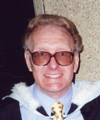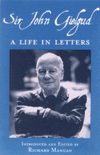 Tony Heyes, our man from England,
reviews... Tony Heyes, our man from England,
reviews...A Different Kind of Love by Jay Mandal and Sir John Gielgud: A Life in Letters |
|
by Jay Mandal
Paperback 252 pages, $14.08 ISBN: 1904224407 BeWrite Books Contact Tony Heyes Contact Jay Mandal The short story is often regarded as the Cinderella of literature. Publishers are reluctant to produce books of short stories on the grounds that they don’t sell. This is odd since historically many short stories are masterpieces in their own right. Maupassant, James, Saki and Ray Bradbury have all written acknowledged works of art in this genre. Why, then, is it a form so often overlooked? Somerset Maugham, himself the producer of many fine short stories, famously said that a story should have a beginning, a middle and an end. To most of us this is a truth universally acknowledged, yet herein lies the difficulty. Many writers of short stories fail to heed this maxim. Forgetting the need for narrative drive, they produce descriptions of mood, fragments of half-forgotten memories, pretentious prose poems or accounts of incidents without meaning. Such pieces of self-indulgence cannot fail to exasperate the reader. It was, therefore, with some hesitation that I began to read Jay Mandal’s collection of short stories on the theme of gay love, “A Different Kind of Love”. My fears were unfounded. First and foremost, Mr. Mandal is a storyteller. All of his short stories have the “And then? And then?” factor. One’s interest is engaged the minute one begins reading them; one wants to know what happens next to his characters. Not all end happily. “Little Venice” is a minor tragedy, whilst “Of Cabbages and Kings” is a poignant tale of self-doubt strangling a promising relationship at birth. Others, notably the title story and “Heaven and Hell” are stories of hopes fulfilled. Too often authors seem to have a tin ear, clearly never reading their dialogue aloud to check its authenticity. They leave the reader wondering if they ever really listen to speech patterns at all. Not so Mr. Mandal; his greatest strength is his dialogue and his sense of humour. He can move the story along by recounting what the characters say – or don’t say. Nervous chattering to bridge awkward moments and oblique approaches to areas of potential misunderstanding are handled with skill. His most satisfying stories leave the reader wanting more and re-reading them to see if there is anything else between the lines. Not all the stories are equally as satisfying. My least favourite is “Child of Liberty”, a tale of a gay man who impregnates a woman whose biological clock is racing towards menopause and who then proposes marriage to her. My objection is not to the handling of the material but because it’s not my own idea of a happy ending! Having said this, I admit to finding this collection extremely enjoyable. Some of the stories are more substantial, and successful, than others. A variety of themes is explored and the fragility and unexpectedness of love is skilfully limned. As a whole the collection is very satisfying, leaving the reader with the feeling, as my grandmother used to say, that “It’ll not always be dark at seven”. There are brighter days ahead and not all gay relationships are doomed to failure. A very recommendable book. |
 Sir
John Gielgud A Life in Letters Sir
John Gielgud A Life in LettersIntroduced and edited by Richard Mangan Arcade Publishing 2004 ISBN: 1-55970-729-1 Contact Tony Heyes Twenty-odd years ago I nearly got my fifteen minutes of fame. Walking quickly through London’s West End I almost knocked down an elderly man who had just rounded a corner into my path. Fortunately I stopped in time to avoid an accident and then we went through that funny “After you. No, after you” little ritual people go through when each party is stepping aside for the other and still managing to be obstructive. Eventually we sorted ourselves out and proceeded on our separate ways. He was dressed rather oddly in a tightly-buttoned, ginger-coloured overcoat and a bottle green trilby. Recognition dawned on me as he walked off. I asked my partner afterwards if he’d seen who it was. “Yes,” he said, “it was The Voice”. It was indeed John Gielgud, an actor as far removed from Olivier’s shouting school of acting as it was possible to be. Had I been walking more quickly the headlines might have read: “PEDESTRIAN BREAKS VETERAN ACTOR’S HIP” or something like that. As it was, obscurity once again claimed me as its own. All that remained was the memory of a surprisingly short Shakespearian. It is interesting to see, therefore, what Gielgud was really like as revealed in his recently published letters. A very different figure from his rather aloof, dandified, Edwardian persona emerges. (He himself was aware of this persona, writing of his need to curb his piss-elegant tendencies and of not being butch enough for some roles). The letters cover almost his entire life from when he was a schoolboy of eight to when he was an old man of ninety-five. Unlike Cecil Beaton, whose unexpurgated diaries were published last year, he seems not to have been a prickly man and tried as much as possible to keep his fences mended. Even when he was young being gay was not an issue for him. It was a given. He had a fetish for corduroy (each to his own) and a highly developed visual sense, with very strong ideas on furniture and decor – “common” and “vulgar” are his chosen epithets of condemnation. He also had a keen eye for the absurd and, even in extreme old age, an ability to laugh at himself. Writing of the making of “War and Remembrance”, filmed when he was eighty-two he said of filming a scene in a gas chamber “I had to lie prone on a mat, while four naked men fell on top of me one after the other – a real gang-bang crematorium!! I might have enjoyed it more in younger and happier days”. Four years later when filming “Prospero’s Books” he says there was “an amazing assortment of players...most of them stark naked. I tried not to stare too obviously at the display of genitalia”. His middle years were clouded by what he referred to as his “trouble” when he was prosecuted for cottaging (soliciting in a public lavatory) in Chelsea. He gave a false name (Arthur Gielgud!) but the famous voice was recognised by a journalist in court and the case received a great deal of publicity. Fortunately his friends rallied round and he weathered the storm. (Immediately afterwards he appeared in a play in Liverpool. Local legend has it that every queen for miles around went to the performance and gave him a riotous standing ovation before he’d even opened his mouth.) His old age was happy almost until the end. In 1962 he wrote “I have a strange Hungarian now, whom I picked up rather shamelessly at the Kokoschka exhibition, who is mysterious, intensely shy, and highly demonstrative – an agreeable once a week diversion". This was Martin Hensler who stayed with Gielgud until his own death, caring for him, beautifying his house and garden and keeping a menagerie of animals and birds. He predeceased Gielgud by twelve months. In the normal course of events he might have been expected to outlive him as he was by far the younger of the two. They clearly had a loving relationship. One touching note he sent to Martin on his birthday reads “I gave you my heart long ago. Wish I had something more worthy to give you now. You have given me your life, and I only pray you do not feel you have wasted it. May the sun shine again for us soon”. One thing that emerges from these letters is how narrow Gielgud’s charmed life was. He thought almost of nothing else but acting. World events, politics and the wider world seemed to interest him but little. He gave his all to his craft. Despite this his letters make fascinating reading as he loved gossip and is very free with his opinions (Garbo is stupid. Brando has very little sense of humour etc.) and are ideal for dipping into. Every page has something to make the reader smile. My only reservation is about the “cast list” at the end of the book which is full of inaccurate dates. |
